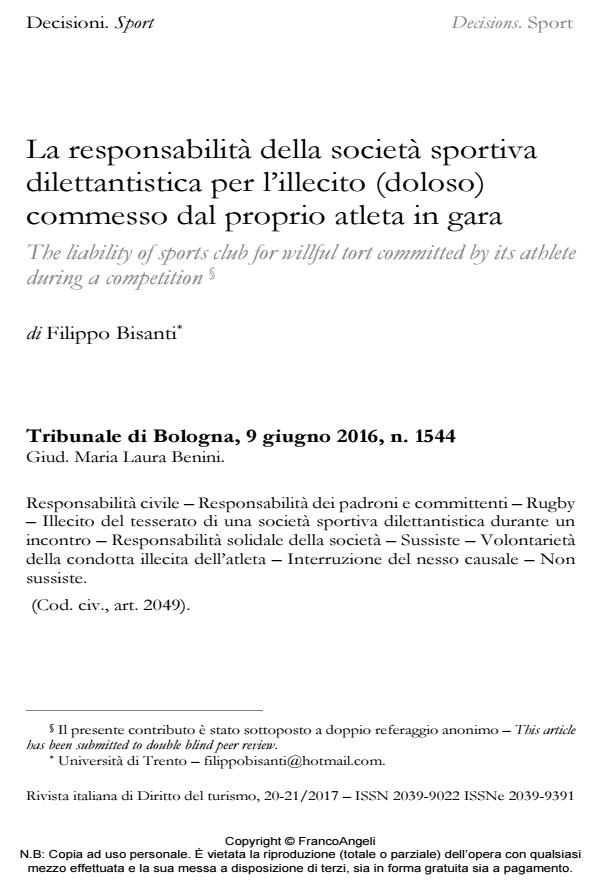The liability of sports club for willful tort committed by its athlete during a competition
Journal title RIVISTA ITALIANA DI DIRITTO DEL TURISMO
Author/s Filippo Bisanti
Publishing Year 2018 Issue 2017/20-21
Language Italian Pages 21 P. 329-349 File size 191 KB
DOI 10.3280/DT2017-020008
DOI is like a bar code for intellectual property: to have more infomation
click here
Below, you can see the article first page
If you want to buy this article in PDF format, you can do it, following the instructions to buy download credits

FrancoAngeli is member of Publishers International Linking Association, Inc (PILA), a not-for-profit association which run the CrossRef service enabling links to and from online scholarly content.
In the decision at hand, the Bologna Tribunal draws certain rules of construction which are particularly interesting with respect to civil liability in the context of sports competitions (field with a multitude of regulatory and disciplinary rules). In this case, during an amateur rugby game, a player voluntarily hits with a violent kick one of the opponents out of the active phase of the game.As a result of the proceedings, the compensation obligation has not been borne exclusively by the materially liable (the athlete), given the absence of a functional link between the conduct and the practiced game, but it has effects also on the athlete’s home amateur sports club. With reference to such last aspect, the Tribunal points out how the power of management and supervision of the amateur sports club over the affiliated and the benefits that the sports club gains from the performances of the athletes should lead to the possibility of establishing a tort liability regime as per art. 2049 c.c. Actually, after the analysis of the exegesis of the liability of masters and contractors as evidenced by the doctrine and by the jurisprudence, the Judge addresses with joint and several liability both the amateur sports club and the athletes with reference to compensatory obligation deriving from the wrongful act committed by the athlete towards the opponent, even though the wrongful act has been committed out ofan active game phase and it has been committed willfully, because such circumstance does not break the direct proximate cause link, it being not a conduct which is totally alien from the parties’ relationship.
Filippo Bisanti, La responsabilità della società sportiva dilettantistica per l’illecito (doloso) commesso dal proprio atleta in gara in "RIVISTA ITALIANA DI DIRITTO DEL TURISMO" 20-21/2017, pp 329-349, DOI: 10.3280/DT2017-020008